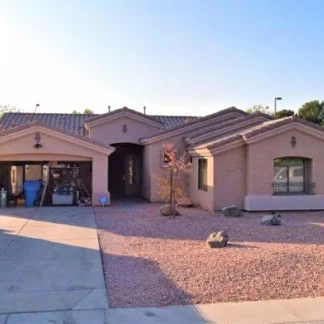Arizona Mentor - Curry
Arizona Mentor - Curry, located in Chandler, Arizona, offers behavioral health c...
Eureka Imperial Residence is a drug and alcohol rehab in Gilbert, Arizona. They provide residential addiction treatment and behavioral healthcare for adults who are experiencing serious mental illness and/or addictive behaviors.
The first step of treatment is a self-motivational enhancement interview that leads to an individual treatment plan. The facility offers long-term and short-term care options and continuation of therapy after hospital discharge. Treatment consists of individual and group therapy, medication management, psychological evaluation, cognitive behavioral therapy, and empowerment to overcome mental health issues. Residents learn effective social skills, behavioral skills, attitudes, and values through group sessions, peers, family, and the community.
Contact us for more information: (480) 264-2647

Connect with Eureka Imperial Residence by calling their admissions team directly.
(480) 264-2647 Website Get DirectionsResearch clearly demonstrates that recovery is far more successful and sustainable when loved ones like family members participate in rehab and substance abuse treatment. Genetic factors may be at play when it comes to drug and alcohol addiction, as well as mental health issues. Family dynamics often play a critical role in addiction triggers, and if properly educated, family members can be a strong source of support when it comes to rehabilitation.
Group therapy is any therapeutic work that happens in a group (not one-on-one). There are a number of different group therapy modalities, including support groups, experiential therapy, psycho-education, and more. Group therapy involves treatment as well as processing interaction between group members.
Trauma therapy addresses traumatic incidents from a client's past that are likely affecting their present-day experience. Trauma is often one of the primary triggers and potential causes of addiction, and can stem from child sexual abuse, domestic violence, having a parent with a mental illness, losing one or both parents at a young age, teenage or adult sexual assault, or any number of other factors. The purpose of trauma therapy is to allow a patient to process trauma and move through and past it, with the help of trained and compassionate mental health professionals.
Group therapy is any therapeutic work that happens in a group (not one-on-one). There are a number of different group therapy modalities, including support groups, experiential therapy, psycho-education, and more. Group therapy involves treatment as well as processing interaction between group members.
Trauma therapy addresses traumatic incidents from a client's past that are likely affecting their present-day experience. Trauma is often one of the primary triggers and potential causes of addiction, and can stem from child sexual abuse, domestic violence, having a parent with a mental illness, losing one or both parents at a young age, teenage or adult sexual assault, or any number of other factors. The purpose of trauma therapy is to allow a patient to process trauma and move through and past it, with the help of trained and compassionate mental health professionals.
Trauma therapy addresses traumatic incidents from a client's past that are likely affecting their present-day experience. Trauma is often one of the primary triggers and potential causes of addiction, and can stem from child sexual abuse, domestic violence, having a parent with a mental illness, losing one or both parents at a young age, teenage or adult sexual assault, or any number of other factors. The purpose of trauma therapy is to allow a patient to process trauma and move through and past it, with the help of trained and compassionate mental health professionals.
Arizona Mentor - Curry, located in Chandler, Arizona, offers behavioral health c...
Valle Del Sol is a community health center in Mesa, Arizona that offers addictio...
Maricopa County Human Services Department East Valley Head Start is a public reh...
New Horizon Youth Homes - Stottler House, located in Chandler, Arizona, provides...